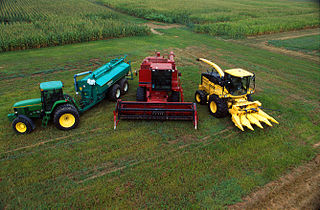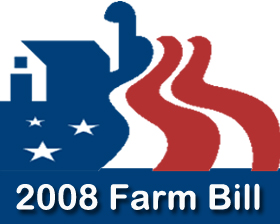Related Research Articles

The economy of Iraq is dominated by the oil sector, which has provided about 99.7% of foreign exchange earnings during its modern history. As of 2021, the oil sector provides about 92% of foreign exchange earnings. Iraq's hitherto agrarian economy underwent rapid development following the 14 July Revolution which overthrew the Hashemite Iraqi monarchy. It had become the third-largest economy in the Middle East by 1980. This occurred in part because of the Iraqi government's successful industrialization and infrastructure development initiatives in the 1970s, which included irrigation projects, railway and highway construction, and rural electrification.

The United States Department of Agriculture (USDA) is the federal executive department responsible for developing and executing federal laws related to farming, forestry, rural economic development, and food. It aims to meet the needs of commercial farming and livestock food production, promotes agricultural trade and production, works to assure food safety, protects natural resources, fosters rural communities and works to end hunger in the United States and internationally. It is headed by the Secretary of Agriculture, who reports directly to the President of the United States and is a member of the president's Cabinet. The current secretary is Tom Vilsack, who has served since February 24, 2021.

An agricultural subsidy is a government incentive paid to agribusinesses, agricultural organizations and farms to supplement their income, manage the supply of agricultural commodities, and influence the cost and supply of such commodities.
Agribusiness is the industry, enterprises, and the field of study of value chains in agriculture and in the bio-economy, in which case it is also called bio-business or bio-enterprise. The primary goal of agribusiness is to maximize profit while sustainably satisfying the needs of consumers for products related to natural resources such as biotechnology, farms, food, forestry, fisheries, fuel, and fiber — usually with the exclusion of non-renewable resources such as mining.
The Foreign Agricultural Service (FAS) is the foreign affairs agency with primary responsibility for the United States Department of Agriculture's (USDA) overseas programs – market development, international trade agreements and negotiations, and the collection of statistics and market information. It also administers the USDA's export credit guarantee and food aid programs and helps increase income and food availability in developing nations by mobilizing expertise for agriculturally led economic growth. The FAS mission statement reads, "Linking U.S. agriculture to the world to enhance export opportunities and global food security," and its motto is "Linking U.S. Agriculture to the World."
The Commodity Credit Corporation (CCC) is a wholly owned United States government corporation that was created in 1933 to "stabilize, support, and protect farm income and prices". The CCC is authorized to buy, sell, lend, make payments, and engage in other activities for the purpose of increasing production, stabilizing prices, assuring adequate supplies, and facilitating the efficient marketing of agricultural commodities.

The Federal Agriculture Improvement and Reform Act of 1996, known informally as the Freedom to Farm Act, the FAIR Act, or the 1996 U.S. Farm Bill, was the omnibus 1996 farm bill that, among other provisions, revises and simplifies direct payment programs for crops and eliminates milk price supports through direct government purchases.
The United States-Colombia Trade Promotion Agreement (CTPA) is a bilateral free trade agreement between the United States and Colombia. Sometimes called the Colombia Free Trade Agreement, it was signed on November 22, 2006, by Deputy U.S. Trade Representative John Veroneau and Colombian Minister of Trade, Industry, and Tourism Jorge Humberto Botero. CTPA is a comprehensive agreement that will eliminate tariffs and other barriers to trade in goods and services between the United States and Colombia, including government procurement, investment, telecommunications, electronics commerce, intellectual property rights, and labor and environmental protection The United States Congress. Colombia's Congress approved the agreement and a protocol of amendment in 2007. Colombia's Constitutional Court completed its review in July 2008, and concluded that the Agreement conforms to Colombia's Constitution. President Obama tasked the Office of the U.S. Trade Representative with seeking a path to address outstanding issues surrounding the Colombia FTA. The United States Congress then took on the agreement and passed it on October 12, 2011. The agreement went into effect on May 15, 2012.
In different administrative and organizational forms, the Food for Peace program of the United States has provided food assistance around the world for more than 60 years. Approximately 3 billion people in 150 countries have benefited directly from U.S. food assistance. The Bureau for Humanitarian Assistance within the United States Agency for International Development (USAID) is the U.S. Government's largest provider of overseas food assistance. The food assistance programming is funded primarily through the Food for Peace Act. The Bureau for Humanitarian Assistance also receives International Disaster Assistance Funds through the Foreign Assistance Act (FAA) that can be used in emergency settings.

In the United States, the farm bill is the primary agricultural and food policy instrument of the federal government. Every five years, Congress deals with the renewal and revision of the comprehensive omnibus bill.

The Food, Conservation, and Energy Act of 2008 was a $288 billion, five-year agricultural policy bill that was passed into law by the United States Congress on June 18, 2008. The bill was a continuation of the 2002 Farm Bill. It continues the United States' long history of agricultural subsidies as well as pursuing areas such as energy, conservation, nutrition, and rural development. Some specific initiatives in the bill include increases in Food Stamp benefits, increased support for the production of cellulosic ethanol, and money for the research of pests, diseases and other agricultural problems.
The agricultural policy of the United States is composed primarily of the periodically renewed federal U.S. farm bills. The Farm Bills have a rich history which initially sought to provide income and price support to US farmers and prevent them from adverse global as well as local supply and demand shocks. This implied an elaborate subsidy program which supports domestic production by either direct payments or through price support measures. The former incentivizes farmers to grow certain crops which are eligible for such payments through environmentally conscientious practices of farming. The latter protects farmers from vagaries of price fluctuations by ensuring a minimum price and fulfilling their shortfalls in revenue upon a fall in price. Lately, there are other measures through which the government encourages crop insurance and pays part of the premium for such insurance against various unanticipated outcomes in agriculture.

The Agricultural Trade Act of 1978 directed the establishment of trade offices in major centers of commerce throughout the world. The agricultural trade offices are operated by the Foreign Agricultural Service (FAS) to develop, maintain, and expand international markets for U.S. agricultural commodities and serve as centers for export sales promotion and contact points for importers seeking to buy U.S. farm products.

The Food, Agriculture, Conservation, and Trade (FACT) Act of 1990 — P.L. 101-624 was a 5-year omnibus farm bill that passed Congress and was signed into law.
The Market Access Program is administered by the Foreign Agricultural Service and uses funds from the Commodity Credit Corporation (CCC). It helps producers, exporters, private companies, and other trade organizations finance promotional activities for agricultural products of the United States. MAP is designed to encourage development, maintenance, and expansion of commercial agricultural export markets. As such, it is considered to be a World Trade Organization "Green Box" program. Activities financed include consumer promotions, market research, technical assistance, and trade servicing.
The McGovern-Dole International Food for Education and Child Nutrition Program (IFEP) is a food aid program authorized in the Farm Security and Rural Investment Act of 2002 which provides for the donation of U.S. agricultural commodities and associated financial and technical assistance to carry out preschool and school feeding programs in foreign countries. Maternal, infant, and child nutrition programs also are authorized under this program. It is named after former U.S. Senators George McGovern and Bob Dole, who advocated in the U.S. Congress for its passage.
An agricultural attaché is a diplomat who collects, analyzes, and acts on information on agriculture, agribusiness, food, and other related spheres in a foreign country or countries. Agricultural attachés may be directly employed by the sending country's agriculture ministry, or they may be employed by the foreign ministry. Typical activities of an agricultural attaché include reporting on crop conditions, food availability, domestic agricultural policy and the foreign trade outlook in agricultural commodities; negotiating food aid agreements and agricultural credit lines; implementing agricultural technical assistance programs; facilitating professional contacts, exchanges, and technology transfer; assisting in negotiating bilateral and multilateral trade agreements; and promoting the exports of agricultural and food products. In many cases, agricultural attachés may also bear responsibility for issues related to the environment, food security, food safety, fisheries, forestry, and indeed anything related to rural areas and the rural economy.
Monetization of U.S. in-kind food aid is the sale of food commodities purchased in and shipped from the United States and sold for local currency in a recipient country by "cooperating sponsors", which are typically U.S.-based non-governmental organizations (NGOs) or recipient governments.

The Department of Agriculture, Fisheries and Forestry (DAFF) was an Australian government department that existed between 1998 and 2013, when it was renamed as the Department of Agriculture. DAFF's role was to develop and implement policies and programs that ensure Australia's agricultural, fisheries, food and forestry industries remained competitive, profitable and sustainable.

Trump administration farmer bailouts are a series of United States bailout programs introduced in 2016 during the presidency of Donald Trump as a consequence of his "America First" economic policy to help US farmers suffering due to the US-China trade war and trade disputes with European Union, Japan, Canada, Mexico, and others. China and respectively European reconcilable tariffs imposed on peanut butter, soybeans, orange juice, and other agriculture products had hit hard, especially swing states, such as Iowa, Ohio, and Wisconsin.
References
 This article incorporates public domain material from Jasper Womach. Report for Congress: Agriculture: A Glossary of Terms, Programs, and Laws, 2005 Edition (PDF). Congressional Research Service.
This article incorporates public domain material from Jasper Womach. Report for Congress: Agriculture: A Glossary of Terms, Programs, and Laws, 2005 Edition (PDF). Congressional Research Service.